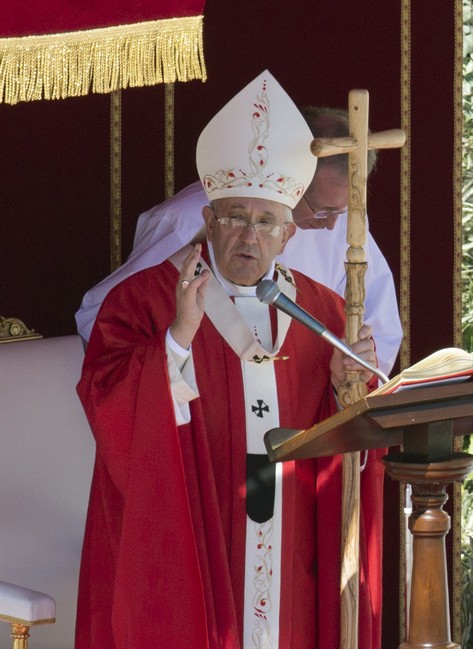In a broad ranging interview Toronto’s Catholic archbishop reflected on the current state of the church around the world and here in Toronto.

In an age of secularism and an apparent backlash against institutional religions in the western world, Toronto’s Catholic community is growing steadily.
That can largely be attributed to the diverse immigration the archdiocese has seen. Thomas Cardinal Collins notes that Sunday masses are celebrated in 37 different languages and have been building new churches at a fairly demanding pace.
WATCH: Cardinal Collins discusses the diversity of Archdioceses of Toronto
“We have opened mega churches – a large thousand person church- once a year for the last fourteen years.” said Collins. “We’ve got three more on the drawing board and we will have to split other parishes.”
That’s the good news but that demand increases the pressure of attaining more priests. At least two priests would be assigned to these larger churches. The Cardinal says fifteen men joined the seminary this year but admits the Church faces challenges.
“But I have no great fears for the future of vocations. We are there. The priests are there. The seminarians are there. I am inspired by them.”
Collins has been the Archbishop of Toronto since December of 2006 and was created cardinal by Pope Benedict XVI in February of 2012. It was about year before Benedict surprised the world and retired from the papacy.
That’s when both the vision and the view of the church changed with the appointment of Pope Francis I.
Collins views Francis as “a very down to earth” and “very decisive person”.
Francis has distinguished himself in a number of ways -first and foremost as the pope of the poor. Collins said “He is a person of great care for those in need and his own experience and his own background (in Argentina) shows him to be a person of great forthrightness.”
Meaning Pope Francis has become known as a pope willing to speak his mind in apparently unscripted or unguarded ways. Collins notes that can all at once be engaging but at the same time poses challenges.
“This particular pope has a great affinity for and a great ability to give these little short statements of faith. They’re often picked up which is great news. That’s good news. The difficulty is they’re not picked up in context”
WATCH: Cardinal Collins discusses the holy week of easter
It’s Francis’ personality that strikes most observers “showing people just who he is and that touches the heart and he is able to proclaim a very challenging message,” said Collins. “People often look at the first part or the second part but they don’t actually listen to what he’s saying. And I think if they do their hearts will be touched and they’ll also be challenged.”
But Collins notes that proclaiming that very challenging message can create challenges within the church and among the public. “(If) you do that very dramatically people might back away because people don’t’ want to face the challenge of conversion. So it’s a delicate balance”
There have been times when that tone has alienated some of the more conservative bishops. Most notable among them is Raymond Cardinal Burke, the former Archbishop of St. Louis.
Pope Francis removed Burke from two key Vatican posts after the cardinal lead a conservative backlash against the Vatican’s efforts to loosen rules of banning divorced, remarried Catholics from receiving Communion.
The pope has challenged the Church’s hierarchy- effectively taking bishops out of their traditional comfort zones.
WATCH: Cardinal Collins gives his opinion on the methods by which Pope Francis I leads the Catholic church
Collins said it’s all about coming to a better understanding and paying closer attention to how Francis presents this papacy.
“I think it’s irrelevant basically on whether bishops are comfortable or not. I think that his style is very different. Every Pope’s style is. He’s very…he steps straight forward. He doesn’t think (about) planning out what he’s going to say. He says things rather quickly and the odds that he will be misunderstood are very high.”
Collins said the church has had “two very great teaching popes – John Paul and Benedict” who provide the context for Francis’ papacy. He said it give Francis the “freedom” to apply the catechism “in a personal way and I think that’s a way that will let people understand.”
But Collins thinks many inside and outside the church get caught up in the “zingers” that come from Pope Francis.
“But what did he express? It’s basically Benedict, John Paul, the catechism of the Catholic Church, the gospel – standard Catholic teaching.”




Comments